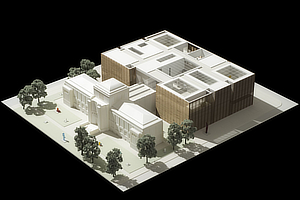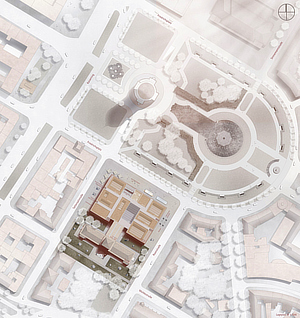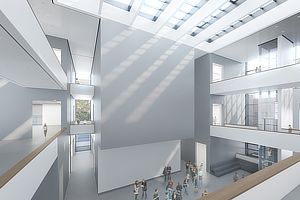 |
 |
 |
 |
 |
 |
| |
 |
|
 |
 |
 |
  |
  |
 |
 |
 |
 |
|
|
 |
|
 |
 |
 |
BUILDING |
 |
|
 |
|
 |
 |
 |
| |
 |
| 
 |
Kunsthalle
|
|
 |
 |
 |
 |
DESIGNER |
 |
|
|
 |
|
 |
 |
 |
| |
 |
|
 |
 |
 |
 |
CONTEXT |
 |
|
|
 |
|
 |
 |
 |
| Relationship with the location |
 |
|
 |
|
 |
 |
 |
 |
 |
 |
 |
DESCRIPTION |
 |
|
|
 |
|
 |
 |
 |
| . |
 |
|
 |
 The construction of the currently largest museum project in Germany was assigned to gmp Architects after the practice had emerged from the international competition in 2012 as one of the three leading contestants. The construction of the currently largest museum project in Germany was assigned to gmp Architects after the practice had emerged from the international competition in 2012 as one of the three leading contestants.
 The new museum building at Friedrichsplatz in Mannheim links up with the historic Art Nouveau building and has been designed as “city in the city”. Within a simple overall structure, individual units have been arranged in an inspiring composition to provide exhibition space and rooms for supporting functions. They enclose a central atrium and are linked via galleries, terraces and bridges. In analogy to the elements that make up urban environments – buildings, blocks, streets and squares – the architects have created varied circular routes through enclosed and open spacs with changing vistas and outlooks. As in the layout of the city of Mannheim with its “street squares”, the clear overruling structure makes orientation easy; at the same time, each situation conveys new impressions – just as the city’s diversity of the architecture, changes in the building lines, recesses and empty plots ensure that no space is identical to another. The new museum building at Friedrichsplatz in Mannheim links up with the historic Art Nouveau building and has been designed as “city in the city”. Within a simple overall structure, individual units have been arranged in an inspiring composition to provide exhibition space and rooms for supporting functions. They enclose a central atrium and are linked via galleries, terraces and bridges. In analogy to the elements that make up urban environments – buildings, blocks, streets and squares – the architects have created varied circular routes through enclosed and open spacs with changing vistas and outlooks. As in the layout of the city of Mannheim with its “street squares”, the clear overruling structure makes orientation easy; at the same time, each situation conveys new impressions – just as the city’s diversity of the architecture, changes in the building lines, recesses and empty plots ensure that no space is identical to another.
As was planned at the time of the foundation of the Kunsthalle hundred years ago, it is given a prestigious elevation towards the park at Friedrichsplatz to mark its contribution to the urban context. From there, visitors enter the central daylight atrium via the new main entrance. The atrium is the point of orientation and also the starting point for the circular tours through special exhibitions and constantly changing displays of collection exhibits on three levels, two of which are connected with the existing building. The exhibition concept includes large rooms with back-lit ceilings that can be used in a variety of ways as well as individual cubes with lateral lighting, and a large open terrace that was specially designed for the museum’s important sculpture collection. The third floor includes a roof garden in the round tour from where visitors can enjoy a view of Friedrichsplatz.
 The facades are cloaked with a transparent metal mesh with bronze-colored coating that defines the external shape of the building and creates a respectful dialogue with the sandstone color of the neighboring buildings. Varying degrees of transparency are achieved with different mesh widths. In this way, the integrity of the overall building shape is preserved while the individual volumes can be experienced in their graded differences from close up or further away, by day or by night. Just as the urban structure of a city provides the ordering context in which each individual building can express itself, the “city of art” concept forms an architectural framework which, at the same time, provides maximum flexibility for the arrangement the museum’s exhibitions. The facades are cloaked with a transparent metal mesh with bronze-colored coating that defines the external shape of the building and creates a respectful dialogue with the sandstone color of the neighboring buildings. Varying degrees of transparency are achieved with different mesh widths. In this way, the integrity of the overall building shape is preserved while the individual volumes can be experienced in their graded differences from close up or further away, by day or by night. Just as the urban structure of a city provides the ordering context in which each individual building can express itself, the “city of art” concept forms an architectural framework which, at the same time, provides maximum flexibility for the arrangement the museum’s exhibitions.
The design, which was revised as part of the negotiation process, features a significantly reduced volume on the basement floor. To achieve this, the designers moved the delivery zone to the ground floor, which made it possible to omit the ramp and other extensive circulation areas. Furthermore, the detailed design of the technical building services revealed that less space was required, resulting in the second sub-floor no longer being necessary. Some of the services have been integrated in and on the roof areas, thus reducing the length of pipelines and ducting. In addition, the architects were able to incorporate improvements in many other areas of the new Kunsthalle Mannheim. In summary, all these measures mean that it will be possible to keep within the budget for the building. |
|
 |
 |
 |
|
 |
|
| . |
 |
|
 |
|
 |
 |
 |
 |
 |
 |
 |
LOCATION |
 |
|
|
 |
|
 |
 |
 |

|
 |

|
Continent |
|
 |
|
Nation |
|
 |
|
Land |
|
 |
|
District |
|
 |
|
Town |
|
 |
|
Address |
|
 |
|
|
|
 |
|
Telephone |
|
 |
|
Fax |
|
 |
|
Website |
|
 |
|
E-mail |
|
 |
|
 |
 |
 |
 |
MAP |
 |
|
|
 |
|
 |
 |
 |
| |
 |
|
 |
 |
 |
 |
|
TYPOLOGY |
 |
|
|
 |
|
 |
 |
 |
|
|
 |
ARCHITECTURE | Buildings for cultural activities
Art galleries and exhibition areas
Operations on existing buildings
Extension, superelevation
| |
 |
 |
 |
 |
CHRONOLOGY |
 |
|
|
 |
|
 |
 |
 |
Project |
 |
|
 |
| 
 |
2012
project winner of limited competiton
|
|
Realisation |
 |
|
 |
| 
 |
2013 - 2017 |
|
 |
 |
 |
 |
BIBILIOGRAPHIC REFERENCES |
 |
|
|
 |
|
 |
 |
 |
|
 |
| Ursula Baus, "A Kunsthalle for all, Mannheim", A10 new European architecture 50, march-april 2013, p. 13 |
|
 |
 |
 |
 |
 |
 |
 |
CLIENT |
 |
|
|
 |
|
 |
 |
 |
| |
 |
| Stiftung Kunsthalle Mannheim |
|
 |
 |
 |
 |
DIMENSIONAL
DATA |
 |
|
|
 |
|
 |
 |
 |
| Surface |
 |
|
 |
|
 |
 |
 |
 |
STRUCTURES |
 |
|
|
 |
|
 |
 |
 |
| |
 |
| schlaich bergermann und partner |
|
 |
 |
 |
 |
LANDSCAPE DESIGN |
 |
|
|
 |
|
 |
 |
 |
| |
 |
| Rainer Schmidt Landschaftsarchitekten |
|
 |
 |
 |
 |
STAFF |
 |
|
|
 |
|
 |
 |
 |
|
 |
|
Design |
 |
| Meinhard von Gerkan and Nikolaus Goetze with Volkmar Sievers |
|
Project leader |
 |
competition: Di Miao
execution: Liselotte Knall, Kerstin Steinfatt |
|
Design team |
 |
competition: Ulrich Rösler, Mira Schmidt, Steffen Lepiorz, Liselotte Knall, Kai Siebke, Frederik Heisel
execution: Anna Falkenbach, Ulrich Rösler, Raimund Kinski, Amra Sternberg, Viktoria Wagner, Hanna Diers, Michèle Watenphul |
|
Lighting engineer |
 |
|
Systems |
 |
|
Plastic models, rendering, visualization |
 |
| Markus Carlsen, Tom Schülke, Jens Schuster, Christoph Pyka, Kenneth Wong |
|
Fire safety |
 |
|
 |
 |
 |
 |
CREDITS |
 |
|
|
 |
|
 |
 |
 |
| |
 |
Images © gmp von Gerkan, Marg und Partner
Text edit by gmp von Gerkan, Marg und Partner
Courtesy of gmp von Gerkan, Marg und Partner
|
|
 |
  |
 |
|
|